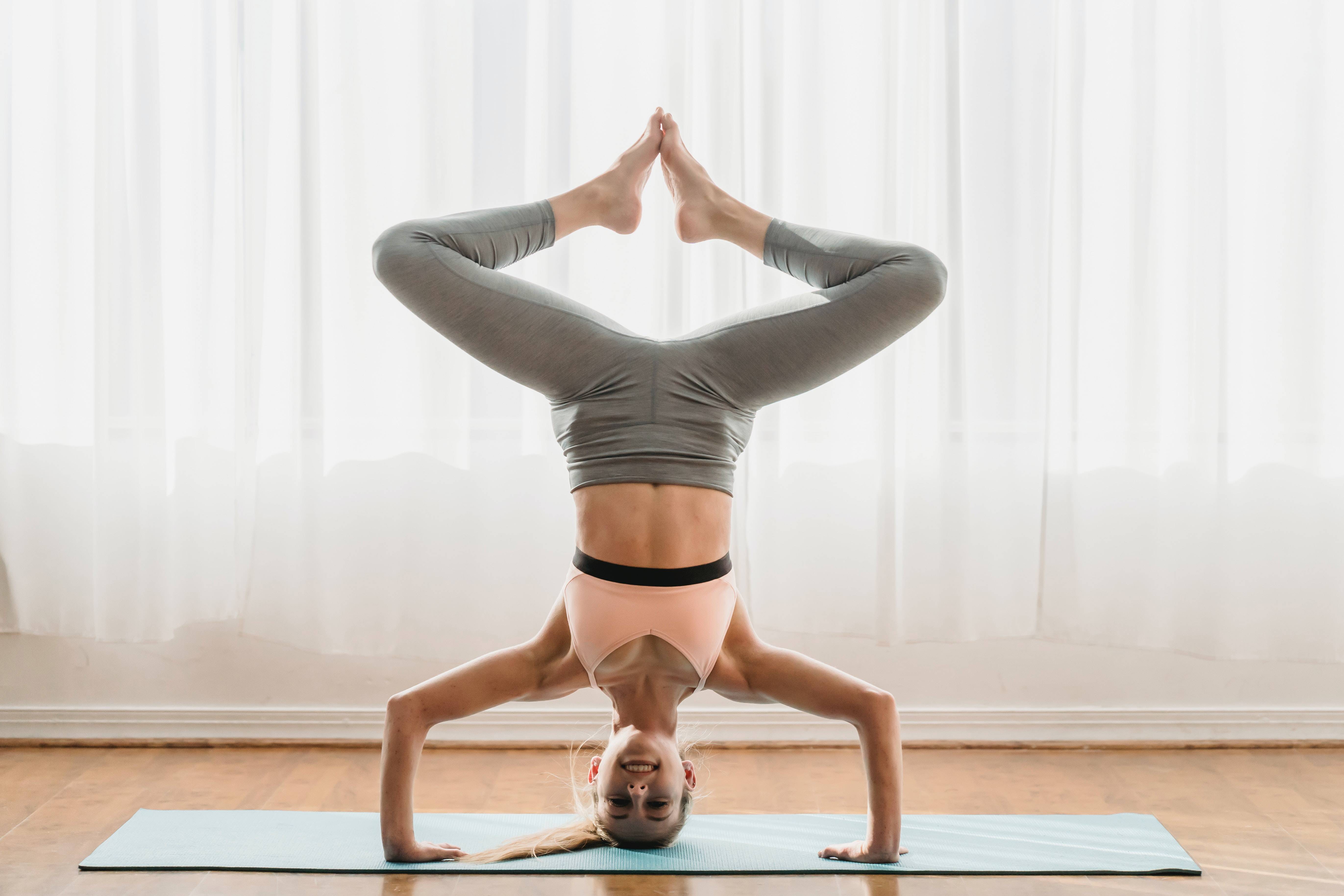
Dandasan is the first of all yogic exercises. Place both your feet on the ground and extend your legs out in front. Your hands should be on each side of your waist. Your fingers should point backwards. You can repeat the exercise eight to ten additional times. Continue the exercise with the third and fourth poses. You may also want to try different variations of the poses. You can also do some of them while sleeping. Here are some tips and tricks for performing these exercises.
To practice yoga, you don't necessarily need to have expensive equipment. You may simply need a yoga mat and a chair. Other than that, you don't need any special equipment to perform these movements. You can also do these exercises from your chair or bed. Some of these poses may be beneficial to women with particular conditions. It's important to check with your health care provider before starting any new exercise routine.

Yoga's main purpose is to combine spirit and matter. This process is known to be moksha. It is the cessation or reduction of all spontaneous activity. This goal conflicts with the one of Christians. They are reminded to make living sacrifices for God to change their minds. Many people doubt the possibility of reaching this goal. Instead, they seek moksha through meditation.
Yogic exercises have many benefits. They increase flexibility as well as strength. They can also help to relax. They can help you relax and improve your mood. The benefits of yoga breathing can ease stress symptoms. Yogic exercises can be very beneficial for women. There is no evidence to suggest that they have any adverse effects on the body. These are myths that may not be true.
Many people don’t know what yoga is. However, yoga is beneficial for many other reasons. They help you become more flexible and reduce your risk of cardiovascular diseases. They can also improve your endurance and immunity. They also decrease the chance of developing heart disease. These are just some of the many benefits of yogic exercise. You should do these exercises at least once per week. You will see results if you do these yoga poses regularly.

Yoga has many benefits. Yoga has many benefits for your mental and physical health. Studies have shown that yoga enhances our awareness of our bodies and improves our brain function. It can improve your mood and help you cope with various health conditions. Some scientists believe that it can lower your risk for developing cardiovascular disease. Some studies have linked yogic activities to higher cognition. Additionally, it may help to reduce impulsive behaviour.
FAQ
What are some examples for mental-emotional disorders?
Any condition that causes major distress or impairment in functioning can be considered mental disorder. Mental disorders include anxiety, bipolar disorder (depression), schizophrenia, borderline personality disorders, obsessive-compulsive disorders, post-traumatic stress disorder (PTSD), eating disorders, substance abuse and other.
What does a psychologist say about mental health?
Psychologists believe that mental wellness is an essential component of human development. They also believe that mental health is not only about having no mental illnesses but also about being mentally fit.
Mental health is a topic that psychologists have differing opinions on. Some psychologists argue that mental well-being is not important, as there are many people without mental illnesses. Other psychologists believe mental health is crucial because we cannot function properly without it.
How do you know if you have a mental illness?
A person may be diagnosed with a mental illness when they experience symptoms that interfere with their daily activities. There are many symptoms of mental illness. The most common symptoms are: sadness, anxiety, guilt, hopelessness, loneliness, depressed and confused, worthless or guilty, suicidal thoughts, and feeling sad.
If a person meets at least three of the four criteria below, they may be diagnosed with a mental disorder.
-
Are you having trouble with your thoughts or emotions?
-
Unruly behavior
-
Disruption in functioning
-
Impairment in the ability to relate to others
Which 5 ways can we improve our wellbeing?
Wellbeing refers to "the state or condition of being physically, mentally, spiritually, and socially well." Several factors affect our well-being, such as family, work, health, relationships, community, environment, education, finances, etc. Your first step in improving well-being and your quality of life is to identify which areas need improvement. Then, try to change these things for the better.
Here are five easy ways to improve your wellbeing
-
Exercise - This increases endorphin levels, which makes us happier.
-
Sleep – A longer sleep time reduces stress and anxiety.
-
Nutrition - Eating healthy foods (such as fruits and vegetables) will boost your mood.
-
Meditation - Regular meditation helps to reduce stress and anxiety.
-
Socialization - Spending quality time with friends and family makes us happy.
How can I improve my mental wellbeing?
Everyone needs mental health, especially when we feel stressed at work, school, home, or family. You can improve your mental health by exercising regularly, eating healthy foods, sleeping well, and spending quality time with family members. Exercise can increase endorphins, which make us happier. Healthy eating habits can also help our bodies function well. Being well rested gives you energy for the day. Finally, quality time spent with loved ones enhances our relationships as well as reduces stress.
Are there any problems with me if my depression is persistent?
Depression is a problem that teens often face. However, it's important to realize that many teenagers struggle with depression.
It doesn't mean you are insane or weak. Many people are unaware that they are suffering from depression. Depression is a medical condition.
There are several kinds of depression. Some people only experience sadness while others experience other emotions too. There are many levels of severity.
Some people are mildly depressed while others experience severe depression. Depression is not always bad. Sometimes it can help us deal with stressful events.
However, if you find yourself feeling demotivated or sad all the time, you should consult your doctor. Your doctor will be able to diagnose you and determine if you need treatment.
Statistics
- More than 50% will be diagnosed with a mental illness or disorder at some point in their lifetime.3 (cdc.gov)
- Similarly, while there is some agreement about the boundaries of typical mental disorders 2, there is likely less agreement about those for positive mental health. (ncbi.nlm.nih.gov)
- Similarly, for positive mental health, there is likely to be substantial agreement about some typical components (e.g., resilience to stress) 6, and controversy about more atypical components (e.g., career consolidation). (ncbi.nlm.nih.gov)
- It means no drinking any alcoholic beverages and no taking any drugs that aren't 100% natural.
- More than 40 million adults in the United States have an anxiety disorder, but less than 37% of people seek mental health treatment for their symptoms. (talkspace.com)
External Links
How To
How to improve memory
Memory is one of those things that everyone wants to be able to remember better. Unfortunately, memory decline is something we all experience at some point. More than half of Americans over 65 are affected by some type of dementia.
It doesn't matter if you have Alzheimer's, dementia or another form of cognitive decline. There are lots of options to help improve your memory. Here are three simple steps you can try today:
-
Eat More Fruits & Vegetables. Fruit and vegetables contain antioxidants, vitamins, minerals, fiber, and phytochemicals that boost brain function. They also contain vital nutrients that protect against neurological illnesses.
-
Get Enough Sleep. Poor concentration and memory loss have been linked to sleep deprivation. Get seven to eight hours of sleep each night.
-
Take a stroll. Walking stimulates blood flow to the brain, which improves memory. Walking makes you slimmer and healthier.